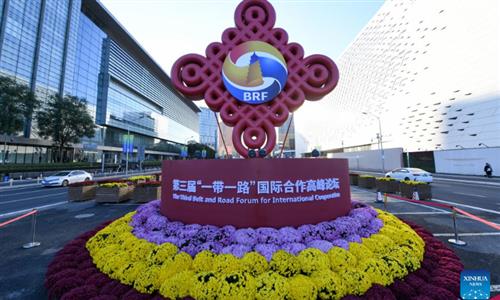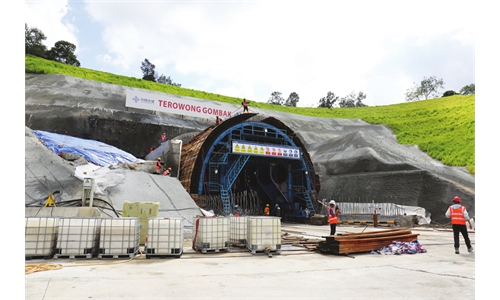Chinese projects companies make a significant contribution to Chile's economic development, regional competitiveness: Chilean economic minister

Chilean cherries arrive at Dalian Port, Northeast China's Liaoning Province, by chartered container ship on January 11, 2023. It is the first shipment of cherries using the South America Cherry Express Line. Photo: VCG
Chinese companies' participation in Chile's infrastructure has made a significant contribution to the country's economic development and has helped increase Chile's competitiveness in the region, Nicolas Grau, the Minister of Economy of Chile, stated in an exclusive face-to-face interview with the Global Times.
These remarks were made during his recent visit to China, together with Chilean President Gabriel Boric and other high-level officials, to attend the third Belt and Road Forum for International Cooperation (BRF) in Beijing, which was held on October 17 and 18. The BRF is a significant event marking the 10th anniversary of the China-proposed Belt and Road Initiative (BRI).
The forum further strengthened China's ties with the BRI partner countries, among which Chile was one of the earliest Latin American countries to participate in the joint construction of this initiative.
Chile has long been at the forefront of developing relations with China, and the bilateral cooperation has consistently played a leading and exemplary role in China-Latin America cooperation. China has also remained Chile's largest trading partner and a major investment partner, with the trade structure between the two countries continuously improving.

Nicolas Grau, the Minister of Economy of Chile Photo: Courtesy of Nicolas Grau
At the BRF, Grau highlighted China's important role in Chile's economic growth through the BRI. "While our economic relationship with China has been strong, we think it can become even stronger in terms of investment and trade, including in renewable energy," the Chilean economic minister told the Global Times, indicating the broader potentials for cooperation ahead.
He also dismissed allegations of the so-called debt traps and project quality issues that the Western media have attempted to associate with the initiative.
Strengthening economic ties
Chile is a major exporter of agricultural products, which hold an important place in its national economy. Among the exports of fresh fruits, cherries rank first in terms of volume, with the vast majority being shipped to China.
Additionally, China also holds the most important consumer market for Chilean wine exports. In 2022, bottled Chilean wine exports to China accounted for approximately 15 percent of the total wine exports, according to the Chilean Wine Association.
China is the largest destination for Chilean wine in terms of export value and Chile is currently China's second-largest supplier of imported wine by value, said the association.

Bottled Chilean wine on display at the 5th China International Import Expo in Shanghai on November 10, 2022. Photo: VCG
From January to September in 2023, Chile's non-traditional trade exports, such as lithium hydroxide, lithium sulfate, distilled fuel oil, gold, iodine, hazelnuts and frozen salmon fillets, reached $33.81 billion, up 3.7 percent year-on-year, of which $5.38 billion, or 16 percent, were exported to China, according to Chilean official data.The Chilean delegation's China visit during the BRF provided a great opportunity for Chile to strengthen cooperation with China under this initiative.
China has consistently been Chile's largest trading partner for over one decade. Chilean exports of products such as cherries to China have seen a significant growth over the past five to 10 years, and this trend is expected to continue in the coming years, the Chilean minister said.
For example, the two countries had signed a joint protocol agreement that will enable, for the first time, the export of three new Chilean aquiculture species, and will enhance the exports of aquaculture species already exported to China, further diversifying Chile's trade with China.
Meanwhile, in new industry sectors, areas of businesses are booming. A wide range of agreements in areas such as Antarctic cooperation, digital economy, promotion of small and medium companies, and economic development were signed during the visit.
In another recent example, through a memorandum of understanding, the Chilean government and Huawei aimed to address digital literacy and technological cooperation.
"All these illustrate the permanent work of the technical teams on both sides, aimed to address a bilateral agenda with content suitable for changing times, but always with the principle of benefiting the peoples of both countries," Grau said.
Furthermore, one of their key aims was to promote foreign investment from China to Chile, particularly in new energy, among other factors, Grau said, displaying their expectations to further advance their production process for lithium and other critical minerals through cooperation with Chinese companies under the BRI.
Commenting on the BRF, Grau said that it is of great importance for cooperation. "We highly value it," Grau told the Global Times. Chile signed a memorandum of understanding with China regarding the joint construction of the BRI in 2018, and "we hope to further enhance our participation in this initiative," he said.
Thriving against odds
Despite the thriving and increasing prospects of bilateral cooperation, China's relationships with some Latin American countries have become the target of Western media, who make baseless allegations of "debt traps" and project "quality issues."
In response to the allegations, the Chilean economic minister said that "we don't find that to be the case in Chile. In fact, all Chinese projects here [in Chile] maintain a high level of quality."
"The performance of Chinese companies in our country and their participation through tenders, as well as increasing investment, are actions guided by the principles of the BRI. In this sense, the performance of Chinese investment in Chile has been favorable," Grau said.
The growth of Chinese companies in Chile is a testament to their confidence in the country and their interests in the conditions offered by Chilean market, especially as a regional platform, Grau said, noting that "China remains one of the most important developers of new projects in Chile."
In 2016, InvestChile, a Chilean agency that promotes foreign direct investment to Chile, had only five Chinese projects in its portfolio, while at the end of the first half of 2023, Chile supported the development of 27 projects from Chinese companies at various stages of development, according to the data that the Chilean Ministry of Economy shared with the Global Times.
China and Chile have significant potential to work together in areas including the digital economy, green economy, and high-tech industries, and collaboration on traditional infrastructure projects will help expand advanced business models in line with the promotion of quality development under the BRI, Wang Youming, director of the Institute of Developing Countries at the China Institute of International Studies in Beijing, told the Global Times on Wednesday.
By teaming up during the global industrial restructuring, both countries can improve their positions in the global supply chain and boost their competitiveness in the region and beyond, Wang said.



